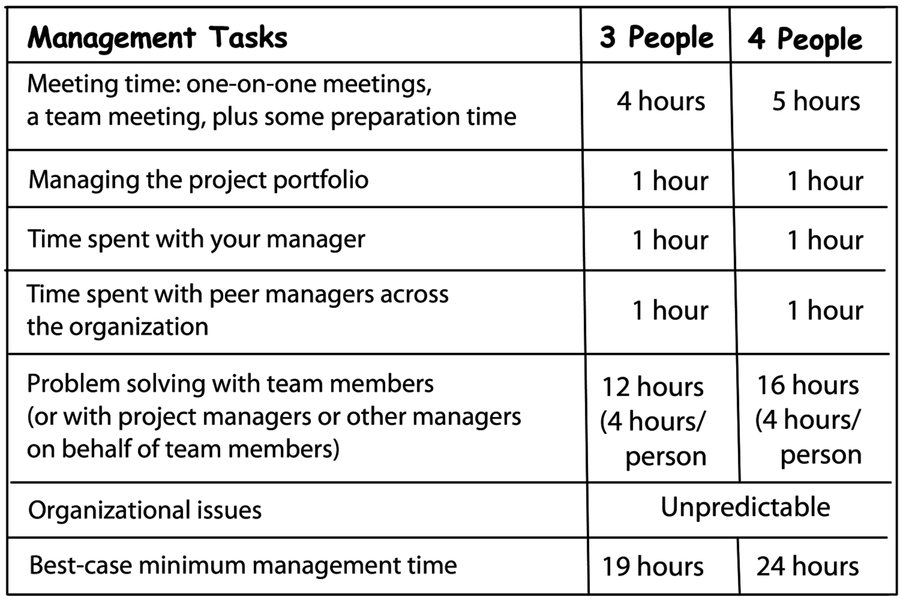Learning to Delegate
Managers need to focus on managerial work. Some first-level managers still do some technical work, but they cannot assign themselves to the critical path. The point where it’s no longer possible to do technical and managerial work depends on the span of management responsibility and the amount of technical work. Giving up technical work is difficult for many technical people because technical work fuels a sense of competence and satisfaction. It’s easier to know when technical work is complete than to know when management work is complete.
If you’re not sure whether to delegate any of your technical work, review this table to see how much time you could devote to technical work.

Figure 8. Management task time
- Decide what you can delegate.
-
Delegating is a primary skill for managers.The New Manager’s Survival Guide: All the Skills You Need for Success, 2nd Edition [Car95] Consider delegating technical tasks first. Once you’ve delegated the technical work, look at management tasks: decide which tasks are strategic and which are tactical. For example, selecting the metrics to include on a management report is strategic; gathering the data is tactical. Tactical work is ripe for delegation.Slack: Getting Past Burnout, Busywork, and the Myth of Total Efficiency [DeM01]
- Understand who has the skills to do the work.
-
Look for a match between the skills and aspirations of your staff and the tasks you consider delegating.Responsible Managers Get Results: How the Best Find Solutions—Not Excuses [FLP98] Consider development opportunities: if someone on your staff wants to move into a leadership role, those tactical tasks may be a great opportunity to begin to understand the management role. (Much of management is strategic work, but starting with the tactical work and moving toward more strategic work can help reduce the learning curve for aspiring managers.) If no one on your staff has the skills or interest to do the work, consider whether you need more people.
- Consider delegating an investment.
-
The payoff for delegation isn’t always immediate. Don’t expect the other person to be 100% productive on a new task. Unless someone has had experience, he or she may not know how to do all aspects of the work. You may still need to coach.A Real Go-Getter [Der04] Eventually, the investment will result in increased capability and lower risk, because another person understands the task.
- Consider the specific results you want.
-
You may have specific deliverables in mind. Or you may be willing to accept a range of results. Communicate the task parameters including time and quality to the person to whom you’re delegating. Focus on the results rather than methods.Tips for Passing the Baton [Rot02] How-to direction is micromanagement.
It takes courage to delegate.Principle-Centered Leadership [Cov91] It also requires trust. You must trust that other people can do a good enough job, even if they don’t do the task quite as well or exactly the way you would.
- Decide how the two of you will monitor progress.
-
Establish periodic checks on progress.The New Manager’s Survival Guide: All the Skills You Need for Success, 2nd Edition [Car95]Becoming a Manager: How New Managers Master the Challenge of Leadership [Hil92] Use frequent checks with less experienced people, and use fewer with those who are more experienced. Provide encouragement, feedback, and help as needed.
